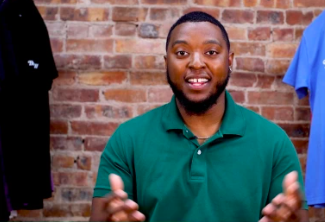Receiving word that his mother was diagnosed with stage-four breast cancer, followed by news that he would soon be a father helped to propel entrepreneur Justis Pitt-Goodson toward what he sees as his destiny: being a businessman like his father.
Pitt-Goodson, 26, started designing bow ties when he was in the eighth grade, as reported by CNBC. He designed, sewed, marketed and sold them to his friends and family, and was encouraged to stick with his passion.

“From an early age, I’ve always been like a hustler, an entrepreneur,” he said.
“I don’t know where I got it from. Mom says I got it from my father, who was also an entrepreneur. So maybe it’s something that’s genetic.”
Now he is the co-founder, creative director and CEO of a successful Newark, New Jersey-based streetwear company called BrownMill, and living in his purpose.
In a matter of a five-year span, the company went from making $20,000 a year to $327,000 in revenue in 2021, documents reveal.
The Road Less Traveled
Unlike many of his peers, Pitt-Goodson had a free ride to Rutgers University and studied business administration at the institution. His mother worked for the school, which allowed his tuition to be covered. However, he believed school wasn’t for him and stepped away after only two years.
He gave it a good try, and while a student he took internships with stylists and New York fashion brands as he tried to pass exams.
“I’m interning with stylists, so I’m learning different parts of every piece of the business of fashion,” Pitt-Goodson said. “I think all that mixed with going to the business school at the same time really helped shape an idea and give me a vision for what I wanted this company to look like.”
He left school and started working seriously on a business he began with two friends, Taha Shimou and Kwaku Agyemang, in high school.
According to the World Economic Forum, 31 percent of students drop out of college to start working. Twenty-eight percent of students who quit college want to start businesses, which showed in 2022 as the largest reason for students leaving.
He took a job as an editor for TheRealReal to supplement his dream, but was fired from his $ 17.50-an-hour job.
Pitt-Goodson said, “It was a job that was more about production and pace rather than quality of work. I just felt like a machine. I had a big quota every day, and I would ultimately have no time to think about what I was doing. I knew it wasn’t serving me. It wasn’t serving my spirit, and before I could quit, they fired me.”
This was coupled with his mother getting sick and his girlfriend getting pregnant. For Pitt-Goodson, it was “make it or break it” time.
BrownMill was started in his family’s Piscataway, New Jersey family’s home, and started to grow the brand with online campaigns directing people to their website and doing activations like pop-up shops to sell their clothes.
What made the brand different, according to Makerhoods, is in addition to mass-produced products, the company also created custom-made and tailored pieces while practicing “urban upcycling.”
The company extracts upcycled materials and makes them into new garments. For every fourth item purchased from the brand, an item is donated to those in need in the community.
The COVID-19 would eventually hamper the brand’s efforts through events like pop-up shops. Quarantine regulations stopped people from gathering and a huge part of the company’s modest revenue streams was impacted.
But Pitt-Goodson and his partners did not give up. The trio started to raise money for their company through crowdsourcing, subscription packages, and creating a twist on their pop-up model where customers would practice social distancing while buying their gear. Eventually, their hard work and innovative ideas allowed them the opportunity to open a brick-and-mortar store.
If It’s Broke … Fix It
To grow the company, Pitt-Goodson said the co-founders did an audience analysis that revealed returning customers bought approximately 12 items from the site’s offerings every year.
This sparked an idea that they hope would bring in more income for the brand: tiers and bundles.
BrownMill started offering tiers of bundled clothing ranging from $200 to $1,000 per year. While it didn’t increase the amount that people spent, it did provide them with a monthly credit they could spend exclusively on the website.
The flip in the benefit for BrownMill is that the company gets the money upfront. With the guaranteed money, they are able to use it on things to help scale the company like buying much-needed machinery used to make some of the clothing in-house.

The BrownMill Shop
In 2020, the brand brought in $86,000. With this success, they opened their storefront in Newark, placing a $7,000 deposit on the lease. The shop opened its doors in June 2021, in Newark’s distinct shopping culture.
“That was an eye-opening experience because … I didn’t know how much my people, Black people, shop for shoes,” Pitt-Goodson recalled. “I recognized a shopping culture in Newark that I didn’t appreciate [yet].”
The location was a perfect spot for him to connect with celebrity influencers and stylists looking for unique pieces.
This is how a connection with former NBA player Dwyane Wade and his wife, actress Gabrielle Union, would come to be.
“That’s how kind of the Gabrielle Union, Dwyane Wade thing happened,” he said. “The stylist came in and bought a whole bunch of items, and ultimately Dwyane Wade liked them and started rocking them.”
Since then, Wade has circle back, giving him a social boost he could have never paid for. He posed for a photo in BrownMill’s “Think Bigger” line July 2021, sparking the attention of new customers.
Other NBA stars like Carmelo Anthony and Andre Iguodala have rocked BrownMill and given it a co-sign.
The Future
In 2022, according to Pitt-Goodson’s estimation, BrownMill should reach $1 million in sales and double that by 2023. The plan is to have the line sold in other larger stores and not just online and in his boutique.
While looking over his life he sees that his drive and focus allowed for his dreams to come true, something many kids from Newark don’t always believe.
“You know, we were young people that started a business and now have a store,” the BrownMill owner says. “I think there’s a lot of young people here in Newark that might have the same aspirations but not have a reference point … I want to be able to give a lot of Newarkians insight to what is possible.”




